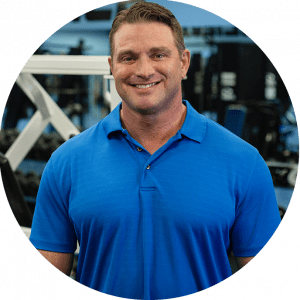

FREE E-book worth £19.95
Free for our readers!!!
Enter email to have it sent directly
We will not use the email for spam
Enter Email To Download
[mautic type="form" id="2"]
20 REASONS YOU CARRY BELLY FAT & THE SCIENCE BEHIND IT+ ACTIONABLE WAYS TO KEEP IT OFF
A big thank you for downloading and a big welcome to our E-Book Here we will give you the secrets and the power to permanently shift that suborn belly fat with easy to implement changes that you can stick to that will change your appearance in a BIG way!
Understanding Fat
 Fat is actually a far more complex subject than many newspaper headlines (and some cookery books) would make it appear. When it comes to body fat, there are two kinds - subcutaneous fat and visceral fat. Subcutaneous fat lies between the skin and the muscle. It performs the important functions of protecting the body against impact and also providing insulation.
Fat is actually a far more complex subject than many newspaper headlines (and some cookery books) would make it appear. When it comes to body fat, there are two kinds - subcutaneous fat and visceral fat. Subcutaneous fat lies between the skin and the muscle. It performs the important functions of protecting the body against impact and also providing insulation.
This is why very slim people both bruise more easily and feel the effect of temperature more easily than people who carry at least some fat. Of course, having too much subcutaneous fat is bad for
you, but it’s nowhere near as bad for you as the other kind of body fat, which is known as visceral fat and builds up around the internal organs and if this sounds really bad for you, then that’s because it is.
People store fat differently based on a variety of factors of which the most obvious is gender. Women tend to store subcutaneous fat on their lower abdomen and down through the hips, buttocks and upper thighs. Within reasonable limits, this is actually perfectly healthy, it protects women during childbirth and the gluteofemoral fat you see on a woman’s bottom and thighs is what is used to produce breast milk.
Men also have subcutaneous fat in these areas, but they have less of it. Fat on the upper abdomen, in either men or women is a sign of visceral fat and is dangerous, as in it increases the risk of heart disease and other serious problems. You should therefore make it a priority to deal with this fat for the sake of your health far more than for the sake of your appearance.
 A word to the wise before you start. Just as fat will build up in different parts of your body according to your body’s natural programming, so it will disappear from different parts of your body in the same manner. The key point to remember is that sooner or later your body will get to the fat you want to lose, in this case the fat on your belly. So, without further ado, here are 20 ways to reduce belly fat and the science behind them.
A word to the wise before you start. Just as fat will build up in different parts of your body according to your body’s natural programming, so it will disappear from different parts of your body in the same manner. The key point to remember is that sooner or later your body will get to the fat you want to lose, in this case the fat on your belly. So, without further ado, here are 20 ways to reduce belly fat and the science behind them.
Learn breathing exercises
Stay with us on this one. Stress often act as a trigger for the consumption of sweet, read high-sugar, foods. (It also has a number of other negative effects). There are lots of techniques which can be used to relieve stress but most of them have some limitations on where and when you can use them, for example, if you work in an office, you may get some strange looks if you just pull out a yoga mat or start meditating at your desk. Breathing exercises, however, can be done anywhere without any equipment, in fact they can be done without anyone even noticing.
The science behind the suggestion
Stress triggers the production of cortisol, a hormone which works to increase the level of glucose in the blood so that the body is prepared for either “fight or flight”. Glucose is basically a form of sugar, hence the craving for sweet “comfort” foods. Learn to deal with stress effectively and you reduce the temptation to consume high-calorie junk foods, which your body will promptly convert into fat.
Be careful with caffeine
 Caffeine is a bit of a double-edged sword when it comes to losing belly fat. On the one hand some studies have suggested that it stimulates the metabolism, thereby helping to burn off fat.
Caffeine is a bit of a double-edged sword when it comes to losing belly fat. On the one hand some studies have suggested that it stimulates the metabolism, thereby helping to burn off fat.
On the other hand, caffeine often comes along with sugar and fat, in some cases quite significant helpings of both, plus excessive use of caffeine can be too stimulating, thus increasing your risk of stress and finally your caffeine use may be covering up problems you really need to tackle.
All that said, we’d suggest that you keep coffee as a “treat” drink and black tea as an occasional drink and make green tea your main social drink. This has a much lower level of caffeine and is rich in antioxidants, including epigallocatechin gallate (EGCG), which is believed to boost the metabolism. If green tea isn’t for you, there are other options such as fruit teas or just decaffeinated versions of regular coffee and team.
If you find yourself objecting that you need caffeine to function, we’d strongly suggest this is a sign of a more serious issue you need to resolve. For example, if you feel you need caffeine to function in the mornings, then you need to look at why. Do you need to work on getting to sleep earlier or getting better-quality sleep or waking up more gently?
We’ll talk more about the importance of sleep later, but for now, the point to take away is that caffeine is supposed to be one of life’s pleasures, not a substitute for getting too little rest.
Water down your alcohol
Some forms of alcohol are believed to have certain health benefits, but these benefits have to be set against the fact that alcohol is full of calories and hence that unless you’re working off those calories in some way, you need to handle alcohol with particular care. In an ideal world, people working on losing belly fat would stay off alcohol completely until they had reached their goal and thereafter include it as a small part of a generally healthy lifestyle (if at all).
In the real world, however, for many people alcohol is an important part of their social life, particularly during the festive season, so the issue then becomes one of managing it as sensibly as possible. The basic rule of thumb is that shorter drinks, such as spirits, contain more alcohol per millilitre (and therefore more calories) than longer ones such as beers. With this in mind, you want to go for drinks such as spirits with a lot of mixer, wine spritzers and beers or ciders or better still shandies.
If this is a step too far for you, then alternate hard drinks with soft ones, going for low-sugar options.
Lower your sugar intake

These days sugar can slip into our diets in all kinds of devious ways, the spoonful in our tea or coffee, soft drinks and even some apparently healthy foods such as fruit juices. This may seem contradictory since we’re continually being encouraged to eat “five a day”.
The reason for this is that when we eat a piece of fruit we eat a lot of fibre and a small portion of sugar. When we drink fruit juice, we drink a small portion of fibre and a lot of sugar.
Control your carbohydrate
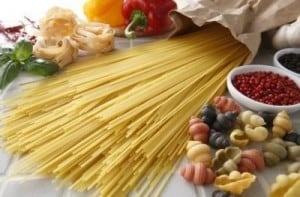 From a nutritional perspective, simple carbohydrates are forms of sugar or substances which are very close to sugar (such as honey and golden syrup) and which the body rapidly converts into energy (sugar rush), whereas complex carbohydrates, such as starchy foods, are broken down slowly to provide a long-lasting source of energy.
From a nutritional perspective, simple carbohydrates are forms of sugar or substances which are very close to sugar (such as honey and golden syrup) and which the body rapidly converts into energy (sugar rush), whereas complex carbohydrates, such as starchy foods, are broken down slowly to provide a long-lasting source of energy.
Limit your consumption of the former but try to include some element of the latter with each meal.
Use quality fats (and only when necessary)
Even though you want to lose belly fat, you will still need some element of fat in your diet, especially in the colder months and that being so try to look for fats which give something back. For cooking try sunflower oil or at least vegetable oil, for dressings there’s olive oil or coconut oil.
Olive oil can also be used as a spread or, if that’s a step too far, there are spreads which are part butter and part olive oil. Remember, these are still fats and still high in calories so use them sparingly.
 Eat plenty of fibre, particularly soluble fibre
Eat plenty of fibre, particularly soluble fibre
Fibre fills you up and helps keep your digestive system in order. Soluble fat is particularly good for those looking to lose belly fat as it absorbs water to become a gel which makes other foodstuffs travel through the digestive system more slowly, thus helping you to feel fuller for longer.
Understand the importance of protein
For years, protein has been advertised as a “muscle food” and this is absolutely true, protein is essential to building muscle. More recently, however, health experts have come to recognize that protein is also a food group which helps people to feel fuller for longer and hence helps with weight loss in general and losing belly fat in particular.
 Always carry some healthy snacks
Always carry some healthy snacks
We know the standard advice about avoiding snacks between meals, but we also know that in the real world life happens and sometimes you do wind up genuinely feeling hungry between meals or being late
to eat. If you go out unprepared, these are exactly the sort of situations where you are at risk of grabbing junk food out of desperation. We’d suggest that you might want to look at protein bars (which can taste better than they sound) as these are affordable, easy to carry and filling. Many of them are suitable for vegetarians and some are suitable for vegans.
Increase your intake of omega-3
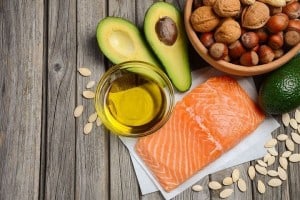 Studies have shown that adults and children have shown that fish-oil supplements can help to reduce visceral (belly) fat. This is believed to be because of the high content of omega-3 fatty acids. If you like oily fish then it’s a good idea to eat a portion of them 2-3 times a week to benefit from the omega-3 content.
Studies have shown that adults and children have shown that fish-oil supplements can help to reduce visceral (belly) fat. This is believed to be because of the high content of omega-3 fatty acids. If you like oily fish then it’s a good idea to eat a portion of them 2-3 times a week to benefit from the omega-3 content.
If you don’t like oily fish, you’re probably not going to like fish-oil supplements either and if you’re a vegetarian or a vegan, you won’t want to take them anyway. Fortunately, the following foods are also very good sources of omega 3: flax seeds and flax oil, chia seeds, hemp seeds, mustard oil (check Indian shops or online), seaweed (spirulina is the best choice here, wakame is also good, health stores will probably have these, if not, check online).
If there’s still nothing here takes your fancy, beans, green leafy vegetables and winter squashes all have omega-3 as do most herbs and spices, but you’ll have to eat quite a bit of them to get the benefit.
Incorporate probiotic foods into your diet
Probiotics are basically good bacteria which help to keep your gut healthy and hence assist in the digestion of food. Some types of probiotic bacteria are particularly helpful when it comes to weight
loss. Look for foods or supplements which contain bacteria with names which start with Lactobacillus, particularly Lactobacillus gasseri.
 Use apple cider vinegar
Use apple cider vinegar
Apple cider vinegar contains acetic acid, which is linked with the reduction of belly fat in both animals and humans. Adding one to two tablespoons of apple cider vinegar to your diet may be enough to cause a modest reduction in belly fat without any further changes to your lifestyle. It can also be useful in keeping up the good work once you have achieved a healthy weight.
Increase your activity levels
Superficially this one is obvious, fat, particularly belly fat, is what happens when you consume more calories than you use, hence increasing your activity levels will encourage your body to start using up its stores of fat. Generally speaking, you want a combination of cardio training and resistance training.
How you go about this, however, will depend on a number of factors and this may be one area where you might want to enlist the help of a professional fitness trainer, at least at the start of your weight loss programme.
If your funds are not up to this, then, you could head to reputable online forums where you can generally find helpful assistance (sometimes from personal trainers). Basically if you are carrying belly fat then, frankly, the chances are that you lack fitness and will probably need to start gently and with low-impact exercises and build up from there. This is definitely a situation where it is better to start slowly and build up as you become fitter and more capable than to try to blitz that belly fat through exercise and wind up injuring yourself or just getting fed up and giving up.
Get plenty of sleep
 In Star Trek Voyager, one of the characters used to refer to sleep as “regeneration” and that’s exactly what it is. In terms of losing belly fat, sleep is every bit as important as exercise and needs to be treated as such, hence if you have problems sleeping, or waking up after sleep, then you need to do something about it.
In Star Trek Voyager, one of the characters used to refer to sleep as “regeneration” and that’s exactly what it is. In terms of losing belly fat, sleep is every bit as important as exercise and needs to be treated as such, hence if you have problems sleeping, or waking up after sleep, then you need to do something about it.
There’s plenty of advice online about getting better sleep but the basics are: set up your bedroom for rest, clear out electronic gadgets (or put them well away from the bed), avoid any strenuous mental activity near bedtime, steer clear of caffeine,
alcohol and excessive liquid consumption from late evening, but make sure you have a good evening meal so that you go to bed comfortably full, invest in a quality mattress and bedding and keep your bedroom at the right temperature and if you struggle to get up on dark mornings, try investing in a “sunrise” alarm clock, which will create a “fake dawn” to ease you into your day more gently.
If noise is your problem, then try earplugs or soundproofing your bedroom. As we said earlier, if you’re regularly using caffeine to compensate for lack of sleep then you need to look at why you are suffering from lack of sleep and fix that issue.
Track your lifestyle habits (food, drink, exercise and sleep)
There’s nothing quite like an honest diary (or at least lifestyle tracker) to keep us on course or to provide the evidence we need to work out why our plans are not turning out as we expected.
Take some cookery lessons
 If you need to lose belly fat, it’s highly likely that your eating habits played a role in how you came to accumulate it and it’s also highly likely that your eating habits involved using convenience foods, which vary widely in their nutritional value.
If you need to lose belly fat, it’s highly likely that your eating habits played a role in how you came to accumulate it and it’s also highly likely that your eating habits involved using convenience foods, which vary widely in their nutritional value.
One of the biggest problems with convenience foods is working out how healthy they actually are since the information on the packaging often only tells part of the story.
For example, you might look at a package and see that the food item contains soybean oil, but what you might not realize is that hydrogen has been added to this soybean oil to create what is known as a trans fat even though you may have heard of trans fats and be aware that they are detested by health professionals.
In fact, studies in monkeys link trans fats with the accumulation of belly fat. In spite of this, trans fats continue to be used routinely in many convenience foods including baked goods, snack foods and coffee creamers. When you create food from scratch, you have complete control over the ingredients and can tailor the content and flavour to your exact needs and taste. This is much healthier for you (and your family).
 Go for a massage
Go for a massage
Massage stimulates your metabolism, basically it makes your body work faster and therefore harder. It might only be a small gain in terms of fat loss, but it’ll be an enjoyable one. For the record, the next time your bathroom is due an upgrade, you could think about investing in a self-contained shower cabin with a hydrotherapy shower, so you can get a decent massage in the comfort of your own shower. A professional
massage therapist will do a better job, but going to one of those every day would probably work out expensive and time consuming!
Try heat treatments (with or without steam)
The same principle applies here. Heat speeds up your body’s systems in the same way that massage does. Steam provides heat and also helps clean the body from the inside out. If you want dry heat, literally, you could look at infrared saunas or infrared heating mats or just use a traditional sauna without the steam (this may involve booking a private session or even buying your own outdoor sauna for regular use).
Alternatively, you could either invest in a steam shower (perhaps one with hydrotherapy jets) or retrofit a steam generator to your existing bathroom. While these suggestions all involve a level of investment and are probably more than you need simply to remove belly fat, if you’re thinking of your long-term health and wellness (both mental and physical), they could be well worth considering.
See what help your employer can offer
These days increasing numbers of employers are recognizing the benefits of helping their employees to take care of their own health. In addition to increased productivity and fewer sick days, healthy people are more positive at work (and in life in general) and companies which support them are often seen as more desirable places to work (and stay working). If you investigate you may find that your employer already offers subsidies for gym membership or is involved in the bike to work scheme.
If not then you could be the one who suggests it or suggests other ways in which they could help. The worst they can do is say no and you may find that your suggestion is enthusiastically adopted.
 Learn to avoid difficult situations
Learn to avoid difficult situations
In this context, difficult situations basically means ones in which you are likely to feel under pressure to act in ways you would rather avoid, such as consuming excess alcohol or eating junk food. Generally speaking, most people will be considerate towards those who are trying to eat and drink healthily as long as you join in with the spirit of the party (no pun intended) rather than just sitting on the sidelines.
There are, however, some people who will do their level best to push alcohol and junk food onto others, particularly visitors and it can be challenging to refuse, especially if you are in their house. If you are really unable to persuade these people to
change their habits then perhaps you could meet them on neutral territory, such as a cafe so you both order your own food or just keep in touch by phone or email.
Reward yourself for progress and for maintaining a healthy lifestyle
Progress is what happens when you decide that the payoff justifies the pain. Your ultimate reward is to lose belly fat and keep it off, but it often helps to give yourself some (healthy) treats when you reach milestones in either losing belly fat or maintaining a healthy weight.
Bonus tip for meat eaters
 Reappraise how you eat meat
Reappraise how you eat meat
For most of history, the meats which are commonplace in supermarkets today were only for the rich. The idea of people eating a “meat-and-two-veg” diet is actually a very modern concept and to begin with, it was a reasonable option since many people worked in very physical jobs (such as farming, manufacturing or domestic service) and hence benefitted from diets which were rich in protein and complex carbohydrates (such as potatoes). Since then, however, many people have
begun to lead much more sedentary lifestyles and even people who would be considered moderately active by today’s standards are probably taking much less exercise than the manual labourers of old.
That being so, from a nutritional perspective, meat, particularly red meat, should be seen more as a treat food. Even white meat and fish should be consumed in moderation.
Fitness fanatic and always on the move. Carly is a certified personal trainer and currently teaches spin class, Zumba, and Body Pump amongst a few others. Carly has a PhD/MSc in Sport and Exercise Nutrition so she really knows her stuff and has worked in fitness and health all her life. We are honoured to have her as a member of the team. Carly has an infectious laugh, loves terrible, terrible jokes and her dog Trevor and often works with a local mental health charity

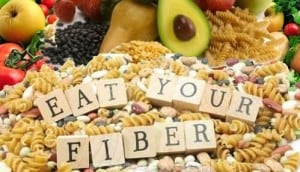 Eat plenty of fibre, particularly soluble fibre
Eat plenty of fibre, particularly soluble fibre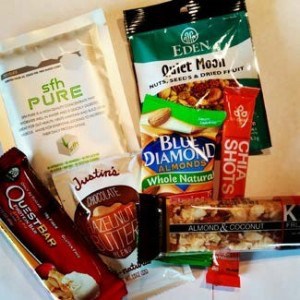 Always carry some healthy snacks
Always carry some healthy snacks Use apple cider vinegar
Use apple cider vinegar Go for a massage
Go for a massage Learn to avoid difficult situations
Learn to avoid difficult situations Reappraise how you eat meat
Reappraise how you eat meat








